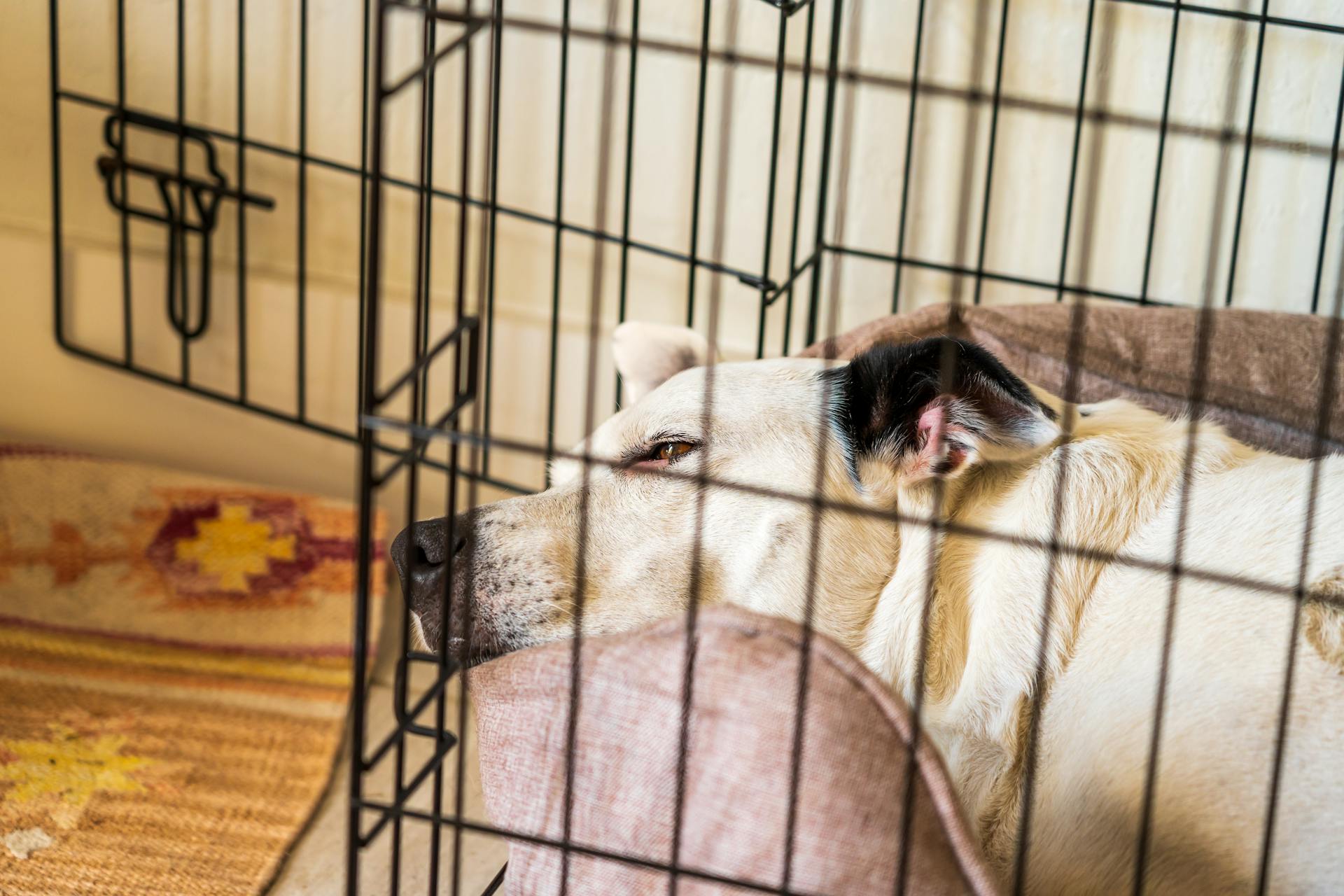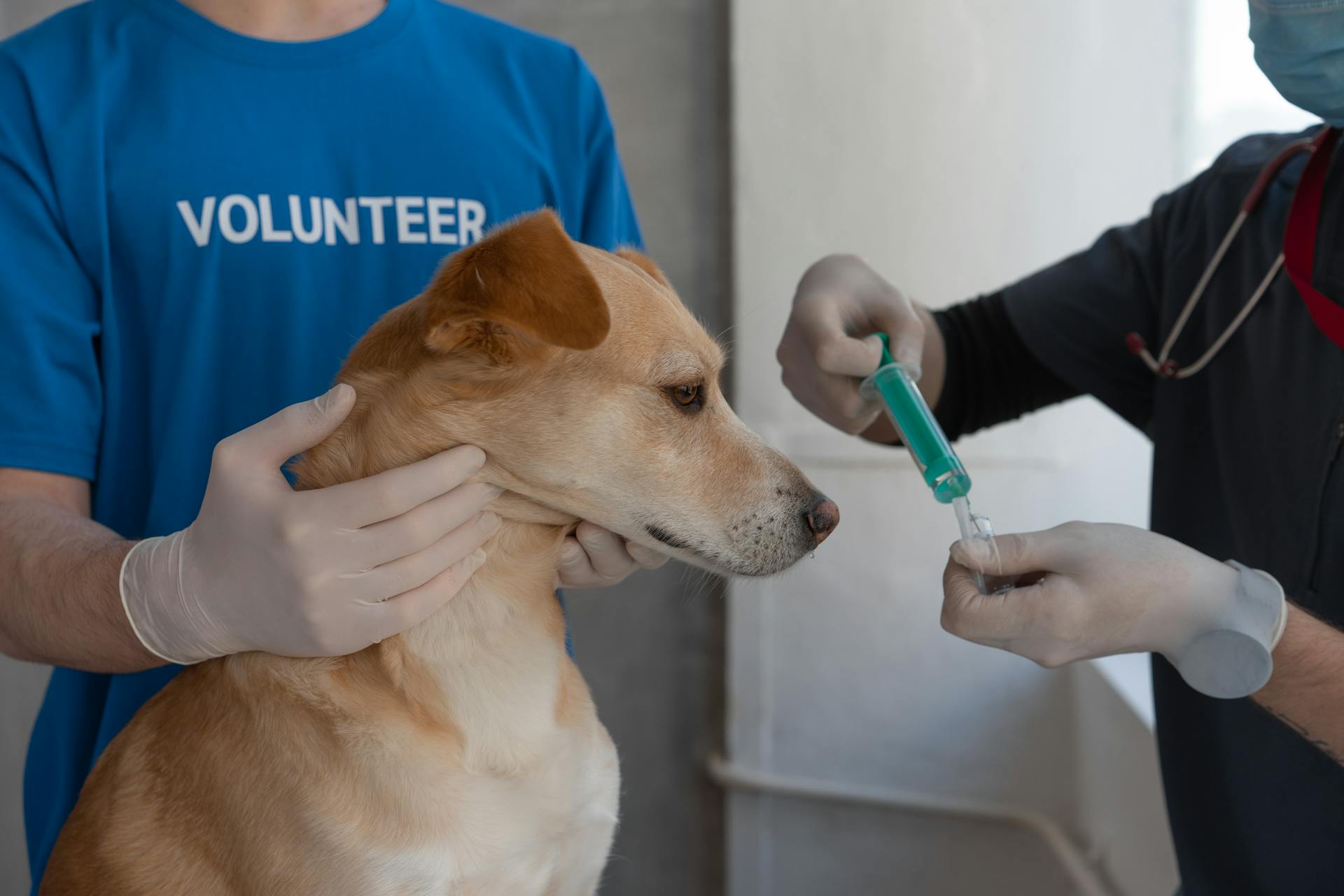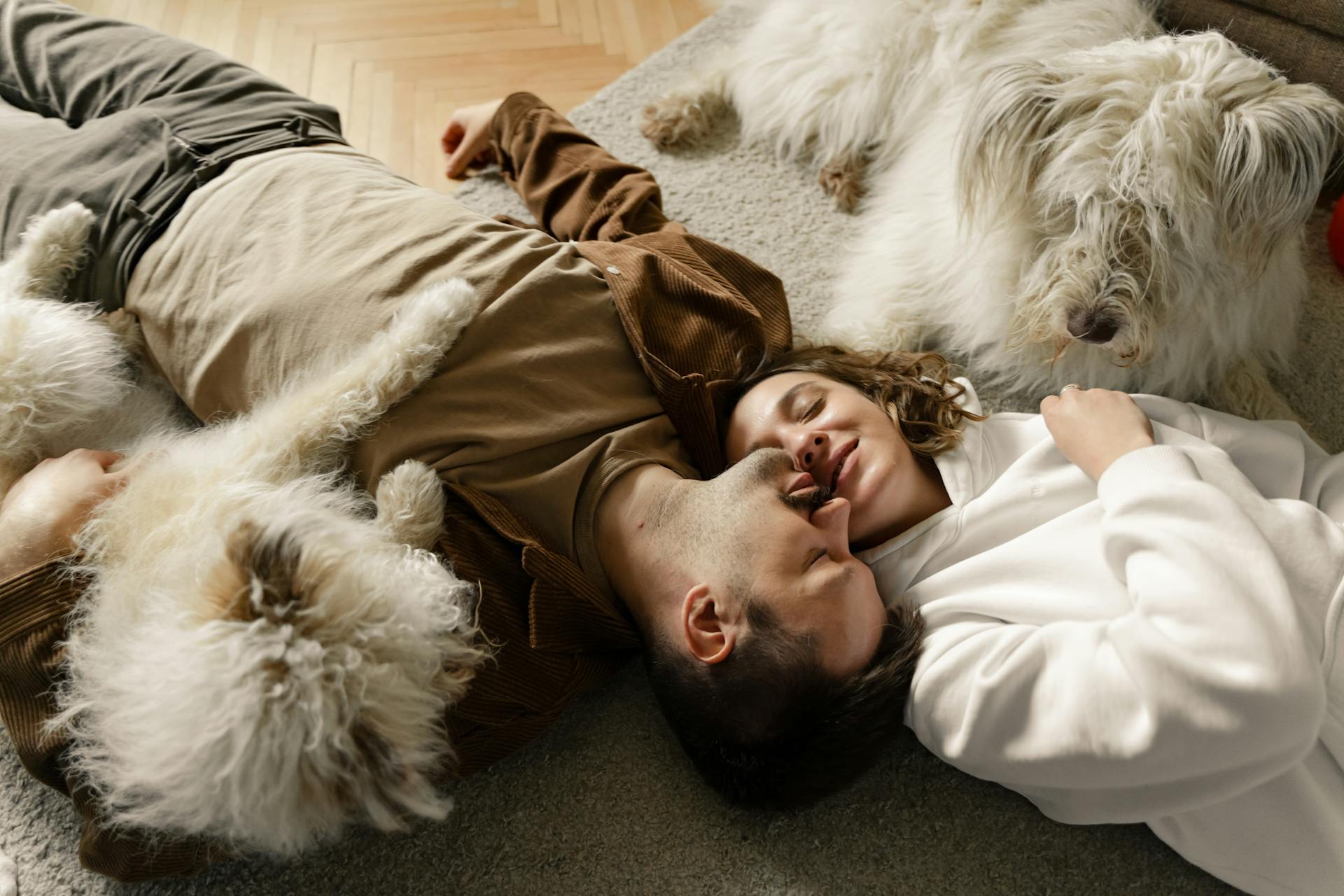
Kennel cough, also known as infectious tracheobronchitis, is a contagious respiratory infection that affects dogs.
The most common cause of kennel cough is the Bordetella bronchiseptica bacteria.
Kennel cough can be spread through the air when an infected dog coughs, sneezes, or barks, releasing the bacteria into the air.
Symptoms of kennel cough typically develop within 5-14 days after exposure to the bacteria, and can include a persistent, dry cough, runny eyes, and a decrease in appetite.
The cough associated with kennel cough is often described as a loud, hacking cough that can be accompanied by a gagging or retching sound.
Broaden your view: Kennel Cough Bacteria
What is Kennel Cough?
Kennel cough is a respiratory disease that affects dogs, caused by the Bordetella bronchiseptica bacteria and canine parainfluenza virus.
The condition attacks the lining of the dog's respiratory tract, leading to inflammation and irritation of the upper airway. This results in harsh, dry coughing that may be followed by retching and gagging.
Broaden your view: Respiratory Allergies in Dogs
The disease is highly contagious and spreads rapidly in places where dogs are in close contact with each other, such as kennels, dog parks, and multi-dog homes. Kennel cough is spread when dogs come in contact with the droplets released through the cough of an infected dog.
The name kennel cough comes from its highly contagious nature, which causes it to spread quickly in environments where dogs interact closely with each other. This is why it's so common in kennels and dog parks.
The severity of the cough usually diminishes during the first 5 days, but the disease persists for 10 to 20 days. Affected dogs have few if any additional signs except for some loss of appetite.
While kennel cough isn't serious for most healthy dogs, it can lead to more serious secondary infections in young puppies, senior dogs, or dogs with a weakened immune system.
Additional reading: Is Kennel Cough Contagious after Antibiotics
Causes and Prevention
Kennel cough can be caused by a combination of airborne bacteria, viruses, and mycoplasma, which is why it's common for dogs to catch it when they're around other dogs.
Dog parks, dog shows, frequent travel, and kennels are high-risk areas for kennel cough. If you've ever had kids in school or daycare, you know how easily illnesses can spread.
To prevent kennel cough, vaccination is a good option, but it's not 100% effective. There are three forms of the vaccine: injection, nasal mist, and oral medication.
Here are the different forms of the kennel cough vaccine:
Your veterinarian will recommend the most suitable form for your dog based on their individual needs.
Causes of
Kennel cough can be caused by a number of different airborne bacteria and viruses. Typically, more than one of these pathogens must bombard the dog at once to trigger illness.
Dog parks and dog shows are high-risk areas for developing kennel cough. Traveling frequently also increases the risk of getting kennel cough.
Dogs that stay at kennels have a higher risk of developing kennel cough than dogs that stay at home most of the time.
Prevention

Prevention is key when it comes to kennel cough. Vaccination is a crucial step in preventing this contagious disease. Your veterinarian can recommend the most suitable form of the kennel cough vaccine, which comes in three forms: injection, nasal mist, and oral medication.
If your dog regularly spends time with other dogs, talk to your vet about getting your dog vaccinated against kennel cough. This vaccine may not be 100% effective, but it can help reduce the severity of symptoms.
Limiting your dog's exposure to unfamiliar dogs is another effective preventative measure. Avoid situations where your dog is in close contact with other dogs, especially if there have been recent outbreaks in your area.
Good hygiene practices can also help prevent the spread of kennel cough. Clean and disinfect shared objects and avoid contaminated areas to reduce the risk of infection.
If your dog does contract kennel cough, it's essential to keep them isolated from other dogs to prevent further spread of the disease.
Expand your knowledge: How Fast Does Kennel Cough Spread
Symptoms and Diagnosis
The primary symptom of kennel cough is a dry-sounding, spasmodic cough caused by inflammation of the trachea and bronchi. This cough can be triggered by excitement or exercise.
Some dogs also develop conjunctivitis, rhinitis, and a nasal discharge. They may also have sneezing fits and develop a clear or slightly mucus-like nasal discharge.
Dogs with kennel cough usually remain active and alert and continue to eat well, but if you suspect your dog has kennel cough, isolate it from other dogs and call your veterinarian.
The characteristic cough can be easily elicited by massaging the dog's larynx or trachea. If the dog is depressed, feverish, or making abnormal lung sounds, diagnostic tests such as a complete blood count (CBC), chest x-ray, and laboratory analysis may be necessary.
Here are some possible symptoms of kennel cough:
- Persistent Coughing: a dry, hacking cough that often sounds like honking or gagging with a retch or a hack at the end of the cough.
- Sneezing and Nasal Discharge: some dogs may have sneezing fits and develop a clear or slightly mucus-like nasal discharge.
- Low-grade Fever: some affected dogs may run a mild fever.
- Loss of Appetite and Lethargy: dogs experiencing symptoms might lose interest in food and appear less energetic than usual.
What Are the Signs of?
The sound of a kennel cough is quite distinctive - a dry, hacking cough that can be triggered by excitement or exercise. It's often described as sounding like honking or gagging with a retch or a hack at the end of the cough.

Some dogs may also exhibit sneezing fits and develop a clear or slightly mucus-like nasal discharge. If your dog is experiencing symptoms, it's essential to keep an eye on their appetite and energy levels - they might lose interest in food and appear less energetic than usual.
A mild fever can also be a sign of kennel cough in some cases. If you notice any of these symptoms, it's crucial to consult with your veterinarian for a proper diagnosis and guidance on treatment.
Here are the common signs of kennel cough in dogs:
- Persistent coughing with a dry, hacking sound
- Sneezing and nasal discharge
- Low-grade fever
- Loss of appetite and lethargy
These symptoms can vary in severity, and if your dog is otherwise healthy, your vet may recommend simply isolating them from other dogs and allowing them to rest for a few days as you monitor their symptoms. However, if your pup's symptoms are more severe, it's best to bring them in for an examination.
Diagnosing
Diagnosing kennel cough can be a process of elimination, as your vet will examine your pet for signs of other serious conditions that share similar symptoms.
Collapsing trachea, heartworm disease, and bronchitis are just a few of the conditions that can cause coughing in dogs.
Your vet will also consider your pet's medical history to determine the likelihood of kennel cough.
Coughing can also be a symptom of canine distemper virus or canine influenza virus, so your vet will need to rule those out as well.
The examination and medical history will help your vet determine whether kennel cough is the likely cause of your pet's symptoms.
On a similar theme: Can Allergies Cause Swollen Lymph Nodes in Dogs
Sources
- https://www.merckvetmanual.com/dog-owners/lung-and-airway-disorders-of-dogs/tracheobronchitis-bronchitis-in-dogs
- https://callananveterinarygroup.com/what-is-kennel-cough/
- https://www.guilfordjamestownvet.com/site/blog-greensboro-vet/2024/02/15/dog-kennel-cough-symptoms
- https://www.brodheadsvillevet.com/site/blog/2024/03/15/what-is-kennel-cough-in-dogs-symptoms-treatment--prevention
- https://vetsoftherockies.com/education/kennel-cough-understanding-canine-infectious-respiratory-disease-complex/
Featured Images: pexels.com


